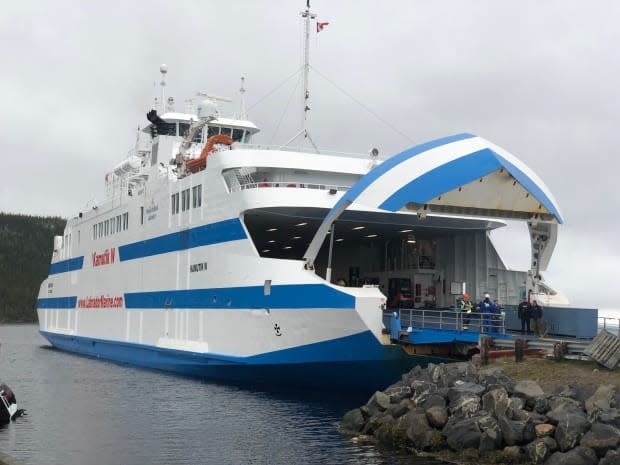What do a tech startup, brewery and conglomerate have in common? Ideas for the next government

(CBC)
Their companies are different sizes, in different sectors and at different stages, but three business owners in Newfoundland and Labrador are offering overlapping advice for the next provincial government, as the campaign enters the final stretch.
The entrepreneurs identified issues and potential areas of opportunity during a panel discussion Feb. 3 on CBC's Here and Now.
Sonja Mills, Port Rexton Brewing Company
Connectivity is one of the biggest issues facing rural businesses according to Sonja Mills, a co-owner of Port Rexton Brewing Company, as cell service and high-speed internet strength varies in pockets of the province.
You can get reception at her newly constructed production facility on the top of a Port Rexton hill, but if anyone wants to make a call from inside the main taproom, they have to wedge themselves into a particular corner, Mills said, and more than two customers can't connect to the Wi-Fi without bumping each other off or causing the system to fail.
Even the smallest of businesses heavily rely on a strong signal, and customers have come to to expect a certain level of service, she said.
"We really can't get the quality that we feel ought to be a sort of a basic level of service in today's day and age," she said, adding that the need for internet access has only grown since the start of the pandemic, with services switching online and many workplaces going remote.
Mills also wants the next government to cut through the red tape slowing down the process of starting a business and restricting operations.

She's seen an improvement over the last year or two, but said industry umbrellas don't account for special circumstances.
Regulations in Newfoundland and Labrador aren't always in line with orders in other provinces, she said. Industry colleagues from across Canada tell her about their respective rules and how much time and money they save.
For example, Mills said she was set back three or four months and a couple of thousand of dollars after purchasing a specialized piece of brewing equipment, a steamed jacket tank from an Ontario distributor, that didn't meet Newfoundland and Labrador regulations, as our rules are different from the rest of Canada.
Isaac Adejuwon, Metricsflow
Like Mills, Isaac Adejuwon, founder and CEO of the startup Metricsflow, feels there's room for government to meet entrepreneurs and better understand their individual or industry needs.
Right now, Adejuwon said, there's a gap in the tech talent pool.
His company, which provides cookie-less analytics by allowing businesses to track customers visiting their websites in a less invasive way, recently graduated from the Genesis innovation hub and moved into office space in St. John's.

Metricsflow employs eight people, including some newer hires from elsewhere in Canada who were supposed to relocate to the province before COVID-19 delayed that and, temporarily, Adejuwon's plan for further growth.
With the recent $2.75 billion US sale of Verafin to Nasdaq, Adejuwon said now is the time to create an even more of a thriving tech ecosystem and establish Newfoundland and Labrador as an industry hub.
Companies need access to more programmers, developers and engineers. People with experience and specialized computer skill sets who can come in and add value to the space, he said.
Going forward, retention will be key.
"We do have institutions already that brings out really great talent. We have MUN that produces great engineers and developers on a yearly basis," he said.
"Making sure we can keep this talent here in this province is very, very important because, again, it comes back to the talent pool to make sure that we do have enough developers and experienced skilled workers in the space to grow the industry."
We're desperate for more people. - Peter Woodward, Woodward Group of Companies
Once companies find workers, establish and build themselves locally, Adejuwon said the next challenge is going global and getting products and services to bigger markets outside of the province and country.
"To do that, there needs to be really strong support from the government to help these products get to much larger markets, be it tech or non-tech products," he said.
Metricsflow is currently in its testing stage with customers in Canada, the United States and Japan.
Peter Woodward, Woodward Group of Companies
Across the province from his Happy-Valley Goose Bay headquarters, Peter Woodward sees secondary processing in traditional resource markets as a huge opportunity for Labrador but, he said, the region is being held back by an aging and shrinking workforce.
"In all sectors of Labrador, you're seeing that immigration has become a key element to being able to operate a business," Woodward, the CEO of Woodward Group of Companies said.
"And it's not just unskilled, it's skilled as well."

Like Adejuwon, Woodward said prosperity will require more people.
His company deals in oil, aviation, auto sales, coastal shipping and ferry services.
"A lot of people want to service the mining sectors and they just don't have enough people to be able to do it," he said.
Local companies could be doing and profiting from that work, he said.
"We're desperate for more people and we think there are a lot of opportunities out there, but you really can't function or perform without the people that are required to run the businesses."
The provincial election is Feb. 13.

